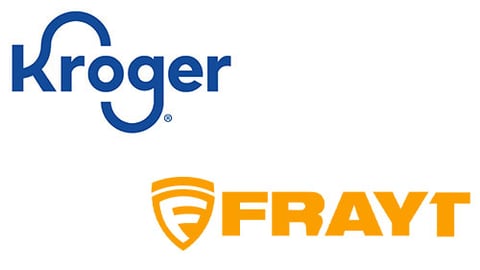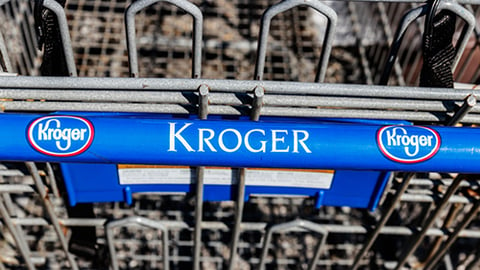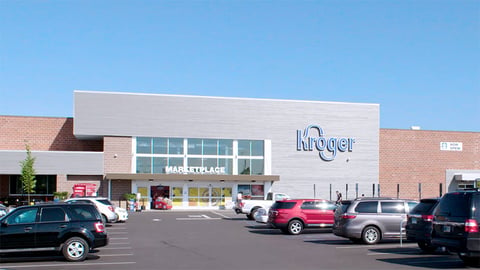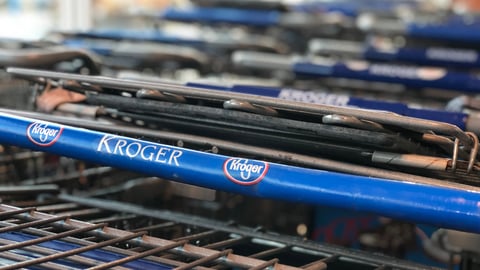Kroger Creates Coronavirus Crisis Guide
The Kroger Co. is serving as a beacon for American business by creating a grand blueprint for retailers, restaurants and foodservice companies, manufacturers, logistics and distribution centers, and other industries to follow as they start crafting plans for safe work environments during the COVID-19 crisis.
Kroger's Blueprint for Businesses includes actionable recommendations and learnings that the company has applied in the last six weeks to safeguard its associates, customers and communities, as well as what it has learned through regular interaction with business leaders in other countries, including Italy, Singapore and China – all of which were ahead of the U.S. in terms of the pandemic cycling through their countries.
"With nearly 2,800 grocery stores, 35 manufacturing plants, 44 distribution centers and 460,000 associates across the country, Kroger has learned and continues to learn a lot while keeping our stores and supply chain open and serving America during the pandemic," said Rodney McMullen, Kroger's chairman and CEO. "As an essential business, we have led with our Purpose: to Feed the Human Spirit and have taken extensive measures across our footprint to safeguard our associates, customers and supply chain. We are sharing what we've learned to help businesses begin to reopen safely and in sync with their respective state plans."
Many recommendations in Kroger's crisis guide can be adapted for any industry sector, and the blueprint provides a set of distinct, deliberate processes for several key sectors, including: Retail, Manufacturing, Distribution Centers/Supply Chain, Food Service/Restaurants, and Office environments.
Late last week, several U.S. governors and business organizations asked Kroger to help their state's businesses to reopen safely. Kroger says it developed this new platform – KrogerBlueprint.com – in 36 hours to begin providing immediate assistance to states and businesses with plans to update with new learnings in real time.
"We decided from the onset of this crisis that transparency, agility and responsiveness would be our guiding principles, and we are now sharing what we've learned as an extension of our values. It's critical for businesses to let their values guide their actions and to develop protocols and procedures in advance of reentering the marketplace to safely reopen, protecting customers and employees and flattening the curve," McMullen said. "We recognize that not all businesses are the same. What worked for us may not work for some companies. And while there is no "one thing" that makes all the difference, taking a comprehensive, thoughtful approach to safety will lead to better outcomes."
Elements of Kroger's blueprint are available now for the retail sector on KrogerBlueprint.com, including a 17-page PDF and downloadable creative assets including in-store signs and audio files. Kroger says it will continue to update the blueprint in the coming days and weeks, providing additional recommendations, insights, best practices, tools and templates for other industries to leverage.
"We share our learnings with the same spirit that many business leaders from around the world have generously shared their experiences with our company, which helped us anticipate the steps we needed to take to provide a safe environment for our associates and customers," McMullen said. "We know that we don't, and we won't, have all the answers – no one business or organization will. It will take all of us sharing openly the ingenuity that has always been the heart of American free enterprise to get through this, together, allowing America to come out stronger."
To see Kroger's full Blueprint for Businesses, click here.
Kroger has been a leader in responding and adapting to what the pandemic has wrought on the business world since February.
Last week Kroger joined the United Food and Commercial Workers International Union (UFCW) in calling for a temporary official "first responder" designation of grocery workers. The designation would improve grocery workers' access to still-scarce personal protective equipment (PPE) such as masks, McMullen said.
"Given the significant daily risk these workers face, we are calling on all of our federal and state leaders to take immediate action," McMullen said in a joint statement with UFCW President Marc Perrone. "Make no mistake, this designation is absolutely critical as it will ensure these front-line workers have priority access to personal protection equipment like masks and gloves."
Kroger has hired more than 32,700 new associates in the past few weeks, many from restaurants, hotels and foodservice distributors that were closed due to the coronavirus.
Additionally, the grocer and its Zero Hunger | Zero Waste Foundation have deployed more than $3 million to hunger-relief resources for those communities most impacted by the coronavirus.
"Since the onset of this pandemic, Kroger family of companies associates, who are also members of the UFCW, have been working tirelessly to make sure that millions of American families have the fresh food and products they need. As all Americans are now witnessing - grocery workers play a critical role in our communities and they must be protected," McMullen added.
Kroger began free drive-thru COVID-19 testing last week in Kentucky. Kroger, which worked with Microsoft, will have a digital registration process at krogerhealth.com/covidtesting for people to schedule their drive-thru testing. Locations are expected to test about 250 vehicles each day.
"We believe this process is the first in the state of Kentucky, and maybe across the nation, provides a very easy way for people to register for the test," Colleen Lindholz, the president of Kroger Health, told the Enquirer.
Lindholz said Kroger's tests are through self-administered swabs.
"We are doing this because, for one, it's less invasive for the patient. Two, it conserves personal protective equipment, which is great. Three, it allows us to test more people in the same day," Lindholz said.
Based in Cincinnati, Kroger employs nearly half a million associates who serve 9 million-plus customers daily through a seamless digital shopping experience and 2,769 retail food stores under a variety of banner names. The company is No. 2 on Progressive Grocer’s 2019 Super 50 list of the top grocers in the United States.






